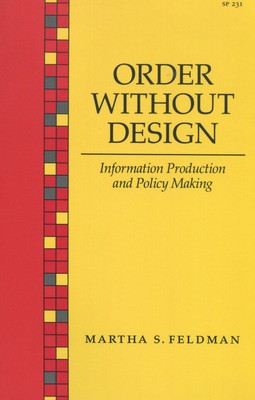
- We will send in 10–14 business days.
- Author: Martha S Feldman
- Publisher: Stanford University Press
- ISBN-10: 0804717265
- ISBN-13: 9780804717267
- Format: 13.7 x 21.3 x 0.5 cm, minkšti viršeliai
- Language: English
- SAVE -10% with code: EXTRA
Reviews
Description
In this lively and, ultimately, disturbing study of policy analysts who are employed in bureaucracies, the author finds a startling paradox. The analysts know that the papers they so painstakingly prepare will not be used; as one analyst remarked, Either it won't get done in time, or it won't be good enough, or the person who wanted it done will have left and no one will know what to do with it, or the issue will no longer exist. Yet the analysts continue to work at producing these papers.
The means of producing information is at the heart of the paradox. The process systematically produces information that is difficult to use directly in decision-making. Yet analysts can do little to alter the constraints of the process. They continue to produce papers because it is their job, they value doing it, and it is their major means of influencing policy. In so doing they make a unique, though indirect, contribution to policy making.
Drawing on eighteen months of observation and participation in the work of the policy office of the U.S. Department of Energy, the author fully investigates the conditions that create the paradox and the positive as well as the negative implications of the process of information production in organizations.
EXTRA 10 % discount with code: EXTRA
The promotion ends in 21d.15:44:24
The discount code is valid when purchasing from 10 €. Discounts do not stack.
- Author: Martha S Feldman
- Publisher: Stanford University Press
- ISBN-10: 0804717265
- ISBN-13: 9780804717267
- Format: 13.7 x 21.3 x 0.5 cm, minkšti viršeliai
- Language: English English
In this lively and, ultimately, disturbing study of policy analysts who are employed in bureaucracies, the author finds a startling paradox. The analysts know that the papers they so painstakingly prepare will not be used; as one analyst remarked, Either it won't get done in time, or it won't be good enough, or the person who wanted it done will have left and no one will know what to do with it, or the issue will no longer exist. Yet the analysts continue to work at producing these papers.
The means of producing information is at the heart of the paradox. The process systematically produces information that is difficult to use directly in decision-making. Yet analysts can do little to alter the constraints of the process. They continue to produce papers because it is their job, they value doing it, and it is their major means of influencing policy. In so doing they make a unique, though indirect, contribution to policy making.
Drawing on eighteen months of observation and participation in the work of the policy office of the U.S. Department of Energy, the author fully investigates the conditions that create the paradox and the positive as well as the negative implications of the process of information production in organizations.


Reviews